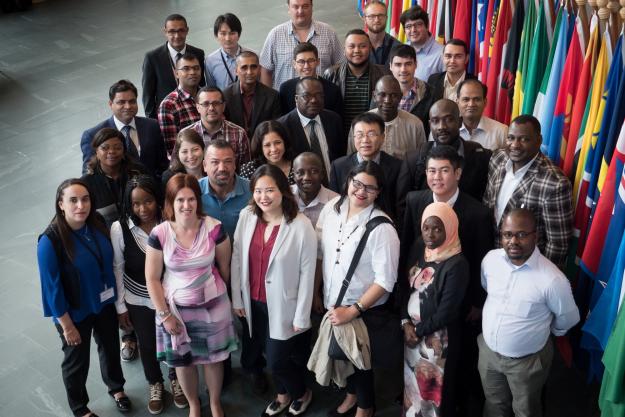
Participants at the 18th edition of the Associate Programme.
THE HAGUE, Netherlands – 28 July 2017 – The 18th edition of the Associate Programme, a flagship capacity-building programme of the Organisation for the Prohibition of Chemical Weapons (OPCW), commenced today at the Organisation’s Headquarters in The Hague.
In his opening remarks, the OPCW Deputy Director-General, Ambassador Hamid Ali Rao, highlighted that the programme represents an invaluable opportunity for the participants to contribute to the continuing success of the Chemical Weapons Convention and the efforts their countries make toward ensuring a world free of chemical weapons.
The Deputy Director-General emphasised the importance of the participants sharing their experiences with each other, inviting them to actively participate in the programme and engage on issues of interest, and share expertise and best practices. He encouraged attendees to “build networks and connections and learn as much as they can from the OPCW experts”.
“Upon your return home, we hope that you will serve as valuable advocates and ambassadors for the implementation of the Convention, as well as for the promotion of the peaceful uses of chemistry,” the Deputy Director-General urged.
Thirty two participants from 31 OPCW Member States will be attending the nine-week course with the agenda combining lectures and exercises at the OPCW Headquarters in The Hague and specialised institutions in the Netherlands. The attendees will also travel to the University of Surrey in the United Kingdom for a three-week Chemical Engineering-Oriented Skills Development Course.
They will afterwards undertake in pairs three-week-long assignments at chemical facilities in 15 Member States in Europe, Asia and Latin America, learning how to operate successfully in a modern chemical industry setting, including the chemical safety framework. The facilities taking part in the programme are located in Argentina, Brazil, China, Czech Republic, Denmark, Germany, Indonesia, Italy, Japan, Malaysia, The Netherlands, Poland, Saudi Arabia, Spain and Sri Lanka.
This year’s participants represent the following countries: Algeria, Bangladesh, Botswana, Brazil, Cameroon, China, Colombia, Costa Rica, Czech Republic, El Salvador, Ethiopia, Ghana, India, Iraq, Kenya, Malaysia, Mongolia, Myanmar, Niger, Nigeria, Pakistan, Paraguay, Poland, Serbia, Sri Lanka, Thailand, Togo, Tunisia, Uganda, Venezuela and Zimbabwe.
Background
Since its inception in 2000, the OPCW Associate Programme has evolved into a major international training project, directly contributing to the economic and technological development of OPCW member states, as stipulated in Article XI of the chemical Weapons Convention.
To date, over 420 experts from nearly 120 countries have participated in the programme.
The Associates Programme is made possible through continuing support from the OPCW Member States and various partners, including representatives of chemical industry, academia and entities such as the World Customs Organization (WCO), European Chemical Industry Council (CEFIC), European Association of Chemical Distributors (FECC), European Chemicals Agency (ECHA), Dutch Customs Authorities, City and Port of Rotterdam, and Technical University of Delft (TU Delft).
As the implementing body for the Chemical Weapons Convention, the OPCW oversees the global endeavour to permanently eliminate chemical weapons. Since the Convention’s entry into force in 1997 – with its 192 States Parties – it is the most successful disarmament treaty eliminating an entire class of weapons of mass destruction.
Ninety-five per cent of all chemical weapon stockpiles declared by possessor States have been destroyed under OPCW verification. For its extensive efforts in eliminating chemical weapons, the OPCW received the 2013 Nobel Prize for Peace.
More Information
- Opening Remarks of the 2017 Associate Programme, Ambassador Hamid Ali Rao, OPCW Deputy Director-General
- OPCW Associate Programme
- OPCW Fact Sheets
